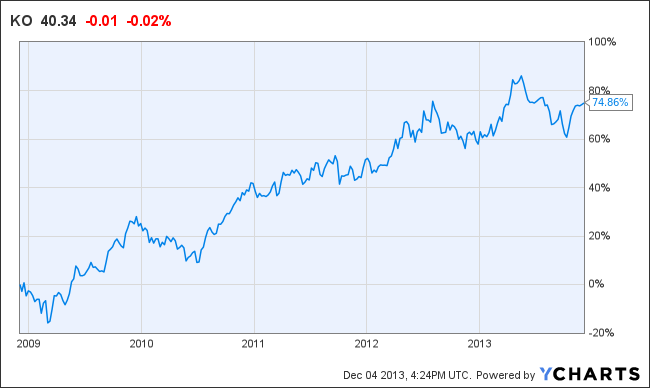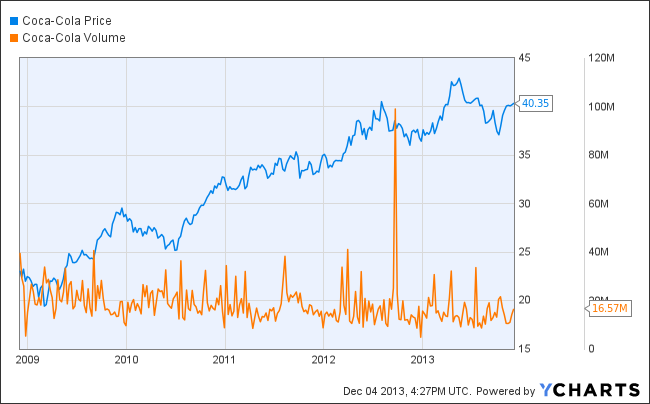Every once in a while, when a company is doing well on the market, there is an announcement of a stock split. A stock split means that for each share you own as a shareholder, you will receive additional shares. Most of the time, we see 2:1 split, which means that you will receive an additional share for each share you own already.
What is the real impact of a stock split?
Is it a good thing?
Is it a bad thing?
Is it simply a marketing move?
This is what we are going to look into in this article. Since the market is not stopping on its journey towards new record highs, stock splits may occur in 2014.
How Stock Splits Work
As previously mentioned, the most common reason why a company would perform a stock split is when the stock price reaches a historical high in dollar values. This has nothing to do with the market value of the company but rather the perception retail investors have for a company’s stock price.
The stock split mechanism occurs similar to a dividend payment. There is an announcement made by the company where it outlines the stock split details (e.g. how many shares you will receive for each that you own). The way the stock split is made is usually through a share dividend. This means that upon the dividend date, the shareholder will receive additional shares of the company instead of receiving cash as a usual dividend payment. There is something similar to an ex-dividend date where owners recorded on the specific date will receive the additional shares.
You don’t have to do anything to make it happen. As is the case with a cash dividend, only the fact that you are a shareholder makes you eligible to receive the new shares. Upon the share distribution, the stock price will drop accordingly. For example, if a stock splits 2:1 and was worth $50 before the split, you will receive an additional share and your stock price will drop to $25 each.
As you can see, there is no value added from the stock split per se. The dividend paid per stock will follow the stock split rules accordingly. Here again, no value is created from the split. The good news is that you are not taxed upon a stock split either!
Finally, if you own share certificates in your safe instead of holding shares in a brokerage account do not destroy your physical share certificates. The certificates are still valid and the split will be calculated the day you wish to sell your position. So, you can still hold them for another 10 years and will still receive the right dividend payouts during that period and still make the same money when you sell your certificates later on.
Is a Stock Split a Good Thing?
In order to evaluate if a stock split announcement is good news or bad news for an investor, I’ve taken the example of two well known companies; Google (GOOG) and Coca-Cola (KO).
For example, a company like Google (GOOG) never split its stock. It is currently trading at around $1,060 per share. Another company like Coca-Cola (KO) has split its stocks 11 times over its history and is currently trading at around $40. Do you think Google is worth 26 times more than Coca-Cola? This is what its individual stock price leads you to think. You may be surprised to learn that Google is “only” twice the size of Coca-Cola when comparing market capitalization (354B Vs 178B). This is only to show you how a stock split could play on your perception of the price of the company but has no real impact on its market value.
Then, if it doesn’t change the market value, what does it bring to split the stock?
This is where it gets interesting. Without searching through your memory, can you, by looking only at the following graph, tell me when the latest KO stock split happened?
As you can see, KO has gone up and down several times during the past 5 years. When looking at the graph, it’s virtually impossible to know when the stock split. The date the stock split was August 13th 2012…when the market value was about the same as today. Therefore, over the past year and a half, KO split didn’t have any impact on its stock value.
When you read the newspaper, some journalist will tell you it enables a better access for retail shareholders. According to what they say, it’s easier for the small investor to own KO shares than to own GOOG since the price is only $40. All right…. Let’s take a look at the *huge* impact that KO recent stock split had on its volume:
As you can see, there is a huge impact on the day the stock was split (that’s the high orange peak). But when you look at the overall stock volume from 2009 to 2013 you notice only one thing; the stock is less traded in volume today than it was back in 2009.
More Accessible to Investors… Really?
There are a lot of theories around how much your minimum investment (in cash or % of your portfolio) should be in a company. I personally like to have a minimum of $1,000 to drop my trading costs below Mutual fund MERs. So with only $1,000, I can’t even buy ONE share of GOOG as I will be short by $60 or so. But since $1,000 is my minimum price, I would just have to wait until I save another $100 in my account to make the trade.
I actually have a real example for you. Take the time to look at my current portfolio. You will notice that I hold only 5 shares of Apple (AAPL). The stock trades around $565 right now. This means my investment worth about $2,825. Is this position better or worse than my 25 shares of Johnson & Johnson (JNJ) that is worth $2,300? Both companies have about the same percentage of my holdings and owning 25 shares of one and 5 shares of the other doesn’t make much difference. If Apple goes up by 10%, I will make another $280. I could have own 50 shares of AAPL trading at $56.50, I would have made the same $280 at the end of the day. So as long as a stock trades under your minimum viable transaction, you can buy a very small amount of shares, it won’t matter!
A Good Marketing Strategy?
Yes…. This is my theory. If the stock split doesn’t affect the company’s value and it doesn’t affect its trading volume, the only thing that it does is to put the company on the front page of the newspaper. Everybody talks about the company splitting shares, blog articles are written and further analyses are made during that period (to determine whether or not it is a good thing for the company…duh!).
I’ve made a quick Google search on “Coca-Cola stock split” and guessed what I found: articles from Bloomberg, Seeking Alpha, Mootley Fool, etc, etc, etc. Besides that? Not much was taken away from this split!
My Take about Stock Splits?
Fairly simple; let people talk about it and invest in sound companies… regardless of their stock price!
What do you think? Are you more inclined to buy a stock with a lower dollar value?
Google+ [3]
